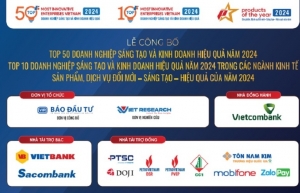Appetite for high-growth stocks linked to semiconductors, AI and digital assets
 |
Lina Nguyen, development manager of Exness Investment Bank, pointed out the investment appetite of foreign financial institutions, saying that they still want to diversify their investment portfolios with their established development models, extensive experience, and market development strategies.
Regarding retail investors, they are suffering more risks due to the fear of missing out (FOMO). Since the outbreak of the pandemic in 2020, retail investors have been moving towards digital and embracing investments online. Retail investors want to learn about investments and improve their financial situations during difficult times, leading to risks, she said.
“Investment funds in developed countries such as Switzerland, the United Kingdom, and the United States have a scale of $1 trillion or more. In Singapore and Hong Kong, investment funds mainly manage assets of around $500 billion. Thus, governments offer very favourable policies for these funds. These funds evaluate and review their investments based on cycles and allocate money to high-return financial categories in their portfolio mix. These institutions will continue to maintain their investment in gold, a safe asset group. They also hold large-cap stocks, especially technology stocks with AI development, and adopt risk-taking strategies to acquire new assets, especially digital assets like Bitcoin,” she said.
Tran Thi Khanh Hien, director of the research department at MB Securities (MBS), was upbeat about the outlook of Vietnam’s stock market in the second half of 2024. “There are a number of positive factors for the stock market. In particular, the Fed is likely to cut interest rates in September. While the economy is on track to recovery, major listed companies representing the economy are also posting higher profits. Interest rates are also likely to rise, but not by much in the second half of the year.”
“Other investment channels have yet to post strong recoveries, so stocks are an option individual investors are taking,” she said. “However, risks include inflation, exchange rates, and foreign capital outflows. Since the beginning of 2024, total net selling by foreign investors has amounted to approximately $1.6 billion. One reason is that Vietnam’s stock market does not have many attractive commodities for investors. In the past two-three years, foreign investors have tended to invest in semiconductor and technology stocks, which are not available on Vietnam’s stock market.”
Nguyen Minh Tuan, co-founder of the Vietnam Financial Advisors Community, said, “There have been more breakthroughs in the market. In terms of stocks, we are facing a pretty big opportunity with a clear signal that the Fed will cut interest rates in September. Of course, we still need to wait for the US election results in November to see if there will be an interest rate cut.”
“As an investor myself and an asset manager for clients, over the past two months, I have increased the proportion of stocks to 60-65 per cent in high-growth portfolios. I have also raised the proportion of investments with liquidity, such as deposits and bonds, in light of rising interest rates. Gold is stable for the moment, and although it is a strategic asset during volatile periods, I have still reduced the proportion of gold in my investors' portfolios following the intervention of the central bank,” he said.
Pham Anh Khoi, deputy head of the Fintech Committee at the Vietnam Blockchain Association, said, “Investors have 20 million digital asset accounts in Vietnam, which quadruples that of securities accounts. Most investors are young with small capital, so they are not worried about losing money. Large investments can be divided into smaller pieces, so it is easy for investors to participate in Vietnam’s digital asset market.”
“Digital assets are not officially recognised but have not been banned in Vietnam. There is a lack of a legal framework to protect the rights of users. Digital asset investors have a very high sense of responsibility because there is no protection agency. They consider very small and moderate investment capital so as not to affect themselves financially. Developed countries like the US, Europe, and Australia are quite open to digital assets, but in a cautious manner. The US government supports digital assets linked to real assets, such as ETFs. If Vietnam can follow that direction, it will open up a huge capital mobilisation channel for businesses,” he said.
 | VIR to host conference on H2 investment opportunities Vietnam Investment Review (VIR) will host a conference to discuss investment opportunities in the remaining months of 2024. |
 | VIR to host seminar on Vietnam's stock market VIR has organised a seminar with the participation of representatives from the State Securities Commission and various securities companies that will aim to provide in-depth stock perspectives and valuable information to investors. |
 | VIR to announce the most innovative firms of 2024 The most innovative and creative businesses in Vietnam for 2024 will be recognised by VIR and Vietnam Research on June 24. |
What the stars mean:
★ Poor ★ ★ Promising ★★★ Good ★★★★ Very good ★★★★★ Exceptional
 Tag:
Tag:
Related Contents
Latest News
More News
- VinaCapital launches Vietnam's first two strategic-beta ETFs (February 26, 2026 | 09:00)
- PM sets five key tasks to accelerate sci-tech development (February 26, 2026 | 08:00)
- PM outlines new tasks for healthcare sector (February 25, 2026 | 16:00)
- Citi report finds global trade transformed by tariffs and AI (February 25, 2026 | 10:49)
- Vietnam sets ambitious dairy growth targets (February 24, 2026 | 18:00)
- Vietnam, New Zealand seek level-up in ties (February 19, 2026 | 18:06)
- Untapped potential in relations with Indonesia (February 19, 2026 | 17:56)
- German strengths match Vietnamese aspirations (February 19, 2026 | 17:40)
- Vietnam’s pivotal year for advancing sustainability (February 19, 2026 | 08:44)
- Strengthening the core role of industry and trade (February 19, 2026 | 08:35)




















 Mobile Version
Mobile Version